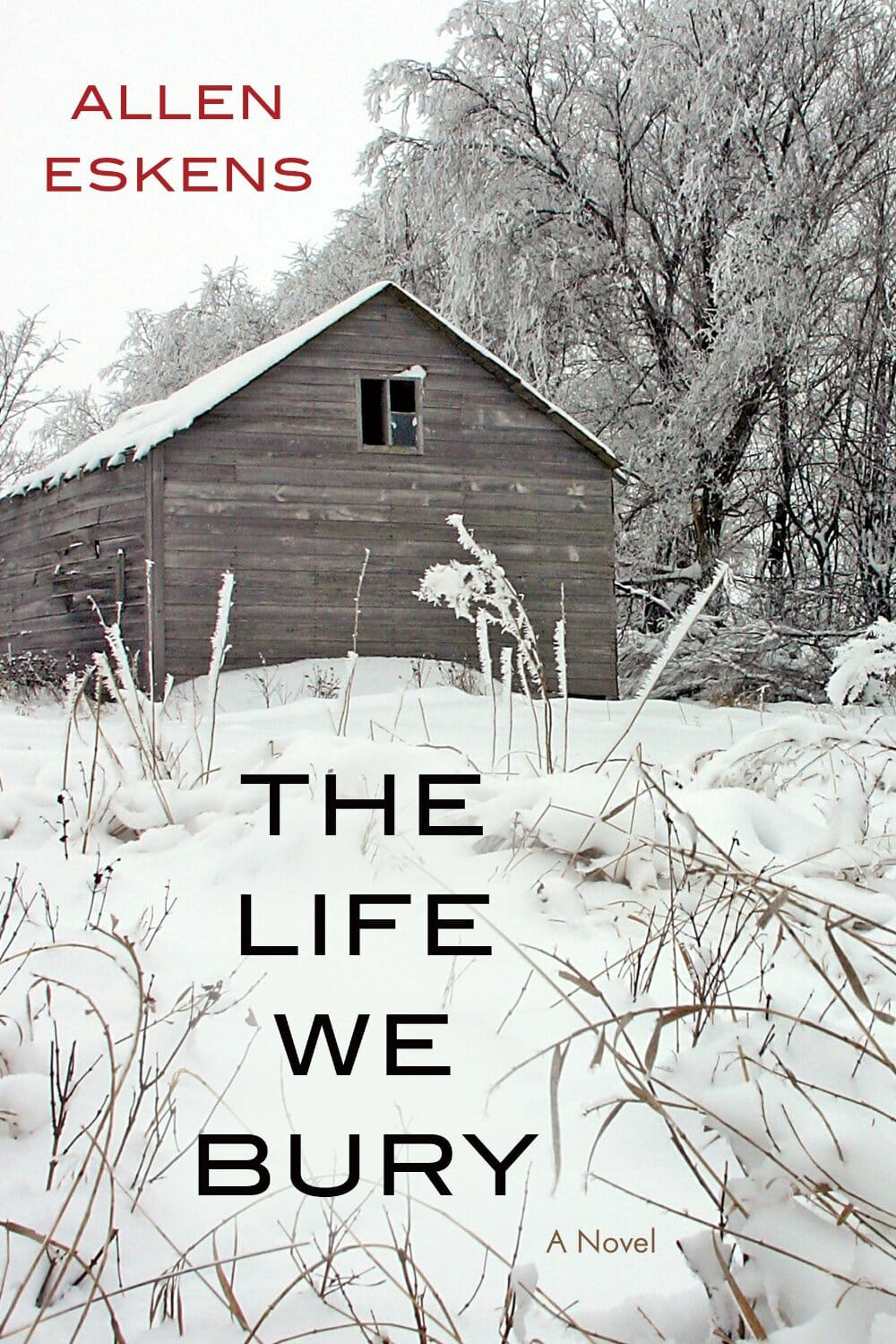
I took one look and asked myself, "What's not to like?" The novel is regional--set proudly in Minnesota. It's central character is taking a college writing class, for pete's sake, doing an assignment that required him to interview someone for a life story. We're on familiar ground here. The Life We Bury is a mystery with a love story too, and the cover is a photograph I could have taken myself, would have, in fact, had I been standing there in the downy snow at that old barn.
So I bought The Life We Bury--on tape, and listened for a couple of weeks' worth of workouts. Easy listening too. Allen Eskens' first novel (okay, I'm also green with envy) is everything the buzz says it is--a perfectly suspenseful whodunit that grabs your attention and won't let go.
I'll admit it. I got soured when The Life We Bury introduced the evangelical Christian, because I knew, long before it was clearly manifest, that the Christian was deranged. If there's going to be a Bible believer in a murder mystery--and a male--he's going to be a nut case.
Doggone it, I'm not always happy to be one myself, but one really gets tired of "same-old, same-old" characters spouting Jesus and hate, Jesus and violence, Jesus and spite. All Allen Eskens has to do is put a Bible verse on the lips of an old man, and, voila!--we got a villain. From the first mention of his Christian faith, I was sure the old man would be an incestuous insane killer. Poor guy didn't have a chance. There I stood on the exercise machine, sweating away, ready to rip out the earbuds because once the insane guy spouting scripture showed up, I knew where this novel was headed.
Well, I was wrong. And that's good.
He may not have done the deed, but the old man with the Bible is still certifiably loony and doubtlessly dangerous. Novels like The Life We Bury simply assume that bible believers are moonstruck, lecherous crazies--like Bill Gothard. You can't be a Christian and not be crazy.
But The Life We Bury does not explore but exploits the human condition. It's genre, and genre at its best. Its forte is not character but plot. If what people might be like seems manufactured in a murder mystery, it is.
I'm glad I picked up The Life We Bury, glad to have read it. I'd love to write a novel like it. But if we compare the murder at the heart of the story to the murder at the heart of the Netflex series The Making of a Murderer, we're comparing apples to junkyard dogs. Both stories involve at-risk families, feature a purposeful search for truth, and show you the blood of an unsolved murder. But they're different as day and night.
Sometime in the 80's, when the incidence of incest seem everywhere, when horrific accusations were being tossed about all over the landscape, when even a Pulitzer Prize winning novel like A Thousand Acres used "recovered memory" as if it were commonplace, I told a friend of mine, a social worker, that I'd like to meet someone who committed incest as so many fathers appeared to have done.
He shook his head. "No, you wouldn't," he said. "He'd probably seem a whole lot like you and me."
What makes The Making of a Murderer so greatly more fascinating is its exploration of the sheer mystery of human nature. In The Life We Bury, there's no doubt where the horror lives. In The Making of a Murderer, after ten hours of documentary, we honestly don't know where the evil lies. Seriously, when you get past the last page of The Life We Bury, the story has no mystery at all.
They're completely different genres, and we tend to read novels like The Life We Bury to get away from stories like The Making of a Murderer.
That's human too.
But The Life We Bury does not explore but exploits the human condition. It's genre, and genre at its best. Its forte is not character but plot. If what people might be like seems manufactured in a murder mystery, it is.
I'm glad I picked up The Life We Bury, glad to have read it. I'd love to write a novel like it. But if we compare the murder at the heart of the story to the murder at the heart of the Netflex series The Making of a Murderer, we're comparing apples to junkyard dogs. Both stories involve at-risk families, feature a purposeful search for truth, and show you the blood of an unsolved murder. But they're different as day and night.
Sometime in the 80's, when the incidence of incest seem everywhere, when horrific accusations were being tossed about all over the landscape, when even a Pulitzer Prize winning novel like A Thousand Acres used "recovered memory" as if it were commonplace, I told a friend of mine, a social worker, that I'd like to meet someone who committed incest as so many fathers appeared to have done.
He shook his head. "No, you wouldn't," he said. "He'd probably seem a whole lot like you and me."
What makes The Making of a Murderer so greatly more fascinating is its exploration of the sheer mystery of human nature. In The Life We Bury, there's no doubt where the horror lives. In The Making of a Murderer, after ten hours of documentary, we honestly don't know where the evil lies. Seriously, when you get past the last page of The Life We Bury, the story has no mystery at all.
They're completely different genres, and we tend to read novels like The Life We Bury to get away from stories like The Making of a Murderer.
That's human too.
No comments:
Post a Comment